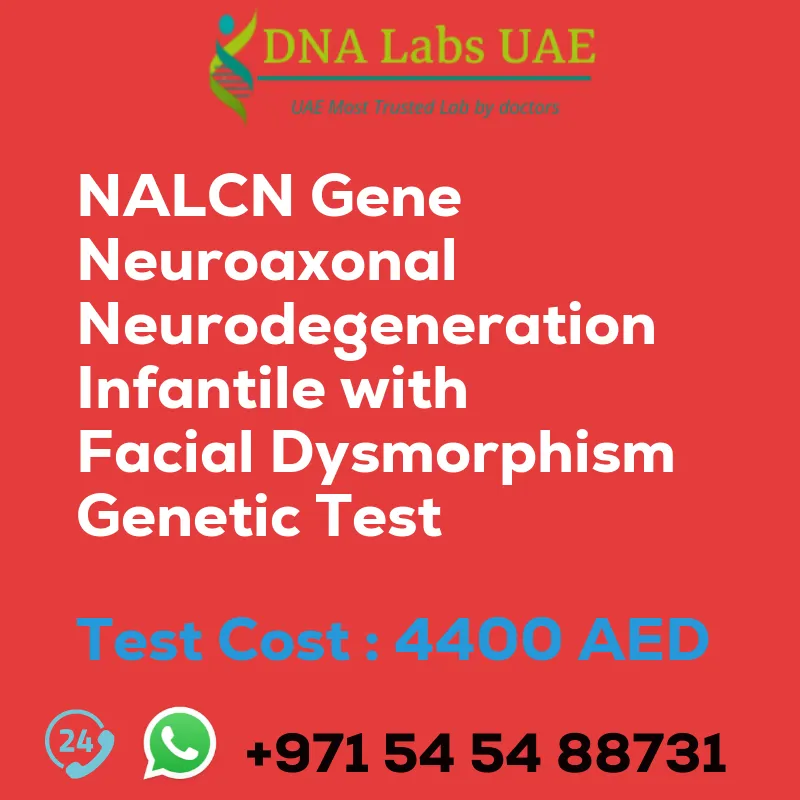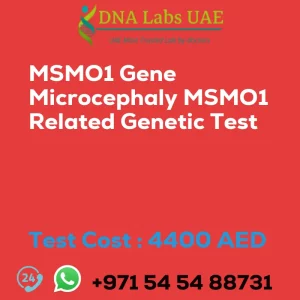NALCN Gene Neuroaxonal Neurodegeneration Infantile with Facial Dysmophism Genetic Test
Neuroaxonal neurodegeneration, infantile, with facial dysmorphism (NNID) is a rare genetic disorder characterized by progressive neurodegeneration and distinctive facial features. It is caused by mutations in the NALCN gene.
NGS (Next-Generation Sequencing) genetic testing is a method used to analyze multiple genes simultaneously to identify mutations or variations that may be responsible for a particular genetic disorder. In the case of NNID, NGS genetic testing would involve sequencing the NALCN gene to identify any mutations or variations that may be contributing to the disorder.
NGS genetic testing can help in confirming a diagnosis of NNID, providing information about the specific genetic mutation involved, and guiding treatment options or management strategies. It can also be used for carrier testing in families with a history of NNID to determine the risk of passing on the condition to future generations.
It is important to consult with a genetic counselor or a healthcare professional experienced in genetic testing to discuss the benefits, limitations, and implications of NGS genetic testing for NNID or any other genetic disorder. They can provide guidance on the appropriateness of testing, interpretation of results, and the potential impact on the individual and their family.
Test Details:
- Test Name: NALCN Gene Neuroaxonal neurodegeneration infantile with facial dysmophism Genetic Test
- Components: NGS Technology
- Price: 4400.0 AED
- Sample Condition: Blood or Extracted DNA or One drop Blood on FTA Card
- Report Delivery: 3 to 4 Weeks
- Test Type: Dysmorphology
- Doctor: Pediatrics
- Test Department: Genetics
- Pre Test Information: Clinical History of Patient who is going for NALCN Gene Neuroaxonal neurodegeneration, infantile, with facial dysmophism NGS Genetic DNA Test. A Genetic Counselling session to draw a pedigree chart of family members affected with NALCN Gene Neuroaxonal neurodegeneration, infantile, with facial dysmophism NGS Genetic DNA Test gene NALCN
For individuals seeking the NALCN Gene Neuroaxonal neurodegeneration infantile with facial dysmophism Genetic Test, the cost is 4400.0 AED. The test requires a sample of blood or extracted DNA, or one drop of blood on an FTA card. The report will be delivered within 3 to 4 weeks using NGS technology. The test falls under the category of dysmorphology and is conducted by pediatricians in the Genetics department.
If you suspect NNID in your family, it is recommended to provide the clinical history of the patient undergoing the NALCN Gene Neuroaxonal neurodegeneration, infantile, with facial dysmophism NGS Genetic DNA Test. Additionally, a genetic counseling session can be arranged to draw a pedigree chart of family members affected by NALCN Gene Neuroaxonal neurodegeneration, infantile, with facial dysmophism NGS Genetic DNA Test gene NALCN.
It is crucial to consult with a genetic counselor or healthcare professional experienced in genetic testing to fully understand the benefits, limitations, and implications of NGS genetic testing for NNID or any other genetic disorder. They can provide guidance on the appropriateness of testing, interpretation of results, and the potential impact on the individual and their family.
| Test Name | NALCN Gene Neuroaxonal neurodegeneration infantile with facial dysmophism Genetic Test |
|---|---|
| Components | |
| Price | 4400.0 AED |
| Sample Condition | Blood or Extracted DNA or One drop Blood on FTA Card |
| Report Delivery | 3 to 4 Weeks |
| Method | NGS Technology |
| Test type | Dysmorphology |
| Doctor | Pediatrics |
| Test Department: | Genetics |
| Pre Test Information | Clinical History of Patient who is going for NALCN Gene Neuroaxonal neurodegeneration, infantile, with facial dysmophism NGS Genetic DNA Test. A Genetic Counselling session to draw a pedigree chart of family members affected with NALCN Gene Neuroaxonal neurodegeneration, infantile, with facial dysmophism NGS Genetic DNA Test gene NALCN |
| Test Details |
Neuroaxonal neurodegeneration, infantile, with facial dysmorphism (NNID) is a rare genetic disorder characterized by progressive neurodegeneration and distinctive facial features. It is caused by mutations in the NALCN gene. NGS (Next-Generation Sequencing) genetic testing is a method used to analyze multiple genes simultaneously to identify mutations or variations that may be responsible for a particular genetic disorder. In the case of NNID, NGS genetic testing would involve sequencing the NALCN gene to identify any mutations or variations that may be contributing to the disorder. NGS genetic testing can help in confirming a diagnosis of NNID, providing information about the specific genetic mutation involved, and guiding treatment options or management strategies. It can also be used for carrier testing in families with a history of NNID to determine the risk of passing on the condition to future generations. It is important to consult with a genetic counselor or a healthcare professional experienced in genetic testing to discuss the benefits, limitations, and implications of NGS genetic testing for NNID or any other genetic disorder. They can provide guidance on the appropriateness of testing, interpretation of results, and the potential impact on the individual and their family. |








